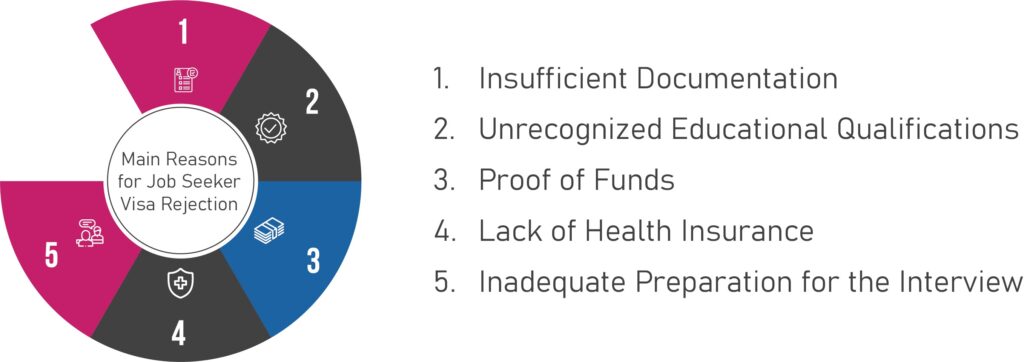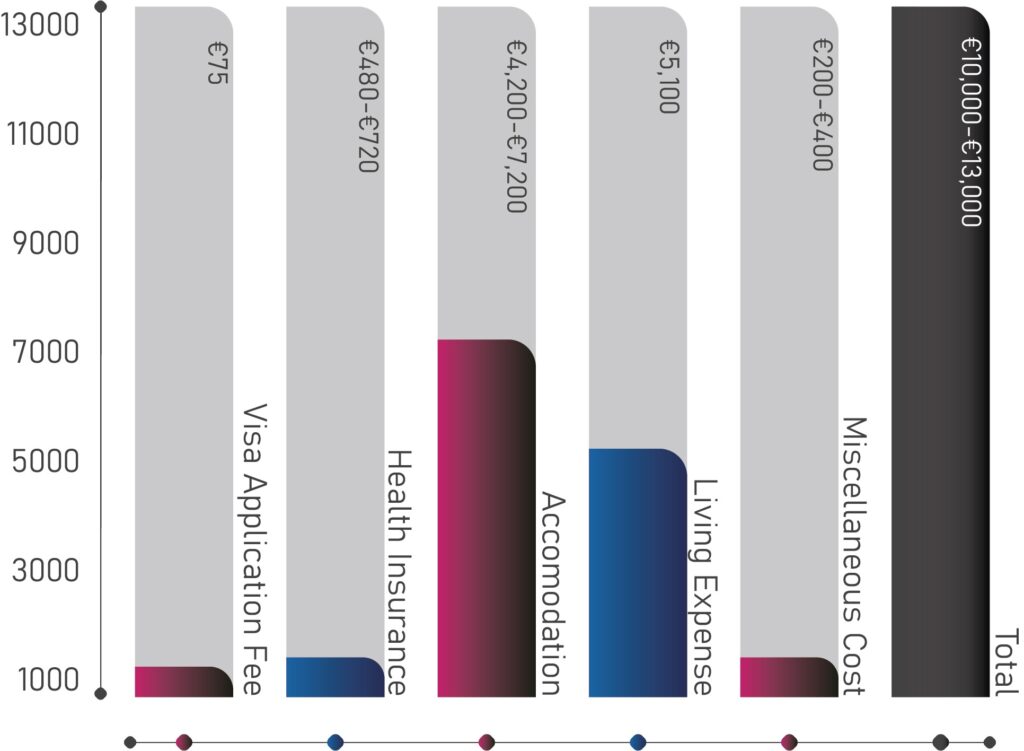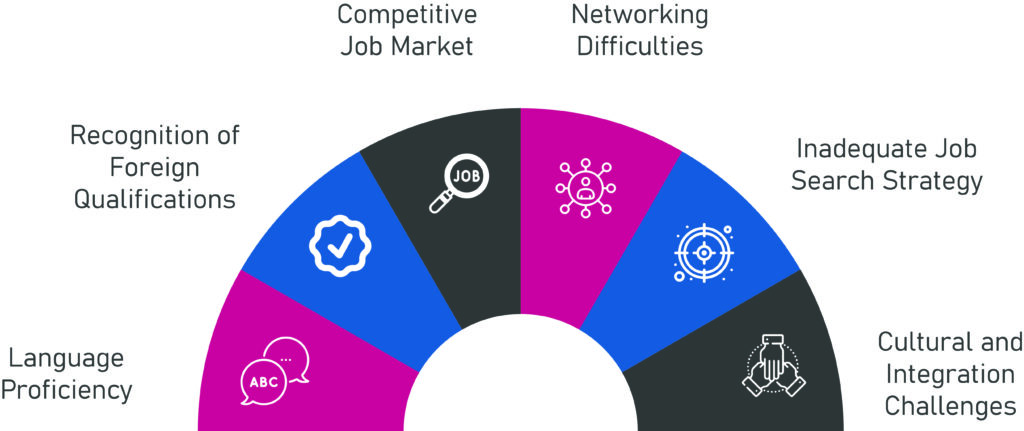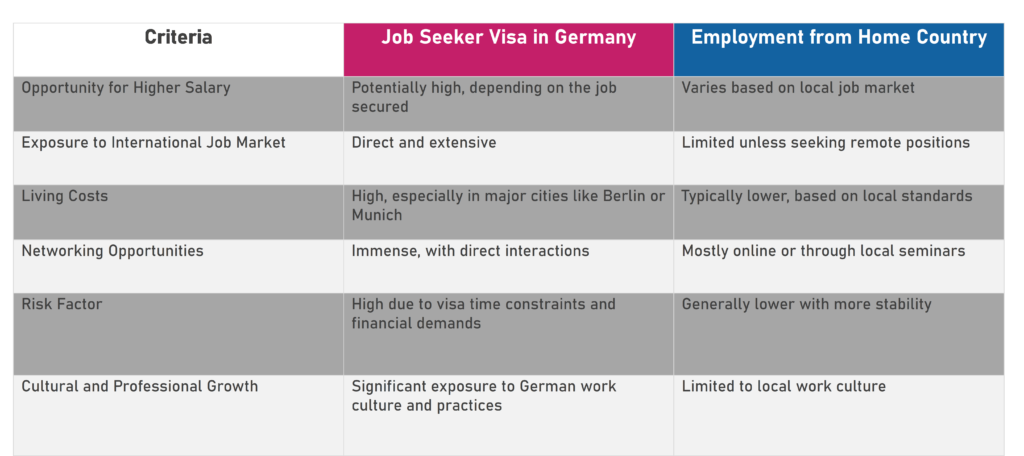How to Obtain a Germany Job Seeker Visa: Step-by-Step Guide
Germany has rapidly become a prime destination for skilled professionals from around the globe. Acquiring a Germany job seeker visa is the first significant step towards this goal. This visa allows you to stay in Germany and search for a job. Let’s delve into the exact steps to obtain this visa.

1. Check Your Eligibility:
- Ensure you have a recognized qualification from German universities or foreign degrees equivalent to German Degrees.
- Have a minimum of 5 years of experience in your related field of study.
Source: German Federal Foreign Office
2. Document Preparation:
- Valid Passport.
- Motivation letter explaining the objective of your search, your alternative plans if the job search fails, and your preparedness to cover your stay.
- Detailed Curriculum Vitae (CV).
- Proof of educational qualifications and job experience.
- Proof of accommodation in Germany.
- Proof of health insurance for your stay duration. Specifically, consider insurers like MAWISTA or DR-WALTER.
- Proof of sufficient funds to sustain during the stay.
3. Fill Out the Application Form:
Access the Germany Visa Application form, complete it meticulously, and print two copies.
4. Schedule an Appointment:
Book an appointment at the German Mission in your country of residence. This can usually be done online through the respective embassy’s website, e.g., German Embassy New Delhi.
5. Attend the Interview:
Present your application form and required documents. Be ready to answer questions about your field of study, experience, and plans in Germany.
6. Pay the Visa Fee:
As of the last update, the visa fee is 75 Euros. However, prices can change, so always check the embassy’s website.

What are the Main Reasons for Job Seeker Visa Rejection?
One must be meticulous when applying for the Germany job seeker visa to avoid common pitfalls that can lead to visa rejection. Being informed is the first step to successful application. Here are the prevalent reasons:
- Insufficient Documentation: Failing to provide all required documents or providing outdated or irrelevant ones.
- Unrecognized Educational Qualifications: Not having a degree that’s recognized or equivalent to German standards. Ensure your qualifications are in line with the Anabin database of Germany.
- Proof of Funds: Being unable to provide evidence that you have sufficient funds to support your stay. This involves bank statements or guarantees.
- Lack of Health Insurance: Not having valid health insurance covering your stay in Germany. Reputable health insurance providers for job seekers include MAWISTA and DR-WALTER.
- Inadequate Preparation for the Interview: Not being able to convincingly answer questions about your intentions, qualifications, or plans in Germany can hinder your visa approval.
Breakdown of Cost of Obtaining the Job Seeker Visa
Navigating the financial aspect of the Germany job seeker visa is paramount. Here’s a detailed breakdown:
- Visa Application Fee: 75 Euros (subject to change).
- Health Insurance: Averages between 80-120 Euros per month. For a six-month period, it would range between 480-720 Euros.
- Accommodation: Depending on the city, a one-room apartment can cost between 700-1,200 Euros per month. For six months, this totals 4,200-7,200 Euros.
- Living Expenses: Including food, transport, and other essentials, you might need an average of 850 Euros per month or 5,100 Euros for six months.
- Miscellaneous Costs: Such as translation of documents, notarization, and others can add up to an additional 200-400 Euros.
Combining all these, a conservative estimate for six months in Germany on a job seeker visa would range from 10,000 to 13,500 Euros. It’s essential to have this budget planned out before embarking on the job-seeking journey.

How Many Fail to Secure a Job on the Germany Job Seeker Visa?
While the Germany job seeker visa provides a fantastic opportunity, not everyone successfully lands a job within the six-month window. Based on recent surveys and studies, a significant percentage of visa holders face challenges. The exact number fluctuates annually, but common reasons for not securing employment include:
- Lack of German Language Skills: While many businesses operate in English, knowing German substantially widens job prospects.
- Mismatch of Skills: Some professionals find that their specific skills aren’t in as high demand as they anticipated.
- Inadequate Networking: Not utilizing platforms like LinkedIn or local job networking events can limit job opportunities.
- Cultural Differences: Unfamiliarity with German job application norms and interview processes can be a deterrent.
To ensure success, visa holders are advised to begin their job search before arriving in Germany, take basic German language courses, and familiarize themselves with German work culture.

Weighing the Job Seeker Visa Against Employment from Home
The Germany job seeker visa is a golden ticket for many, but is it for everyone? Especially with currency conversion rates unfavorable for many countries, it’s crucial to weigh the pros and cons.
Pros of Job Seeker Visa:
- Direct exposure to the German job market.
- Networking opportunities in person.
- Familiarity with German work culture.
Cons of Job Seeker Visa:
- High living costs without a guaranteed job.
- Pressure of a six-month timeframe.
- Potential visa renewal challenges.
On the other hand, finding employment from one’s home country provides stability but might limit the range of available job opportunities.
In conclusion, it’s paramount to thoroughly research, prepare, and weigh your options before embarking on the journey with a Germany job seeker visa.

In-Depth Conclusion: The Feasibility of the Germany Job Seeker Visa in a Financial Context
Navigating the journey to Germany on a job seeker visa presents both immense opportunity and inherent risk. One pivotal factor that potential applicants must earnestly assess is their financial capability. This visa’s nature necessitates a solid financial foundation, given the living costs in Germany, coupled with the uncertainty of securing employment within a six-month timeframe.
Remote Work: A Financial Cushion
For those fortunate to have a remote job that they can continue whilst in Germany, the job seeker visa becomes considerably less financially intimidating. Earnings in stable currencies, such as the USD, GBP, or CAD, can translate to comfortable living in Germany. This allows applicants the freedom to job search without the pressure of depleting savings rapidly.
However, it’s worth noting that working while on a Germany job seeker visa requires compliance with German regulations. While remote work for a non-German employer might be generally acceptable, always ensure you’re abiding by visa stipulations.
Currency Conversion: The Hidden Challenge
Currency conversion is a pivotal consideration, especially for applicants from countries where the national currency might be significantly weaker against the Euro. For instance, for someone from Nigeria, India, or Pakistan, converting the Naira, Rupee, or Pakistani Rupee to Euros means a substantial financial commitment. As a frame of reference:
- As of the last update, 1 Euro was equivalent to approximately:
- 230 Nigerian Naira.
- 90 Indian Rupees.
- 200 Pakistani Rupees.
This conversion rate, combined with the estimated living costs in Germany, could mean that the applicant’s savings and monthly expenditures could be three to five times (or even more) than what they’d experience in their home country.

The Final Word
The decision to embark on the Germany job seeker visa journey is multifaceted. While the allure of working in Germany, with its robust economy and enriching work culture, is undeniable, the financial implications are paramount. For those with a substantial financial cushion or a stable remote job, the risks are mitigated. However, for many others, especially those from countries facing unfavorable currency conversion rates, seeking employment from the comfort of their home country might be the safer, more pragmatic choice.
It’s essential to make an informed decision, leveraging facts, figures, and personal financial assessments. This approach ensures that the dream of working in Germany is pursued sustainably, with both passion and prudence.
Frequently Asked Questions (FAQs): Germany Job Seeker Visa
1. What is the primary purpose of the Germany Job Seeker Visa?
- Answer: The Germany Job Seeker Visa allows non-EU nationals to search for employment in Germany, granting them a stay of up to six months to find suitable work. Once they secure a position, they can then apply for a German employment visa.
2. Are German language skills necessary for the Job Seeker Visa requirements?
- Answer: For the Job Seeker Visa Germany requirements, German language proficiency isn’t mandatory. However, understanding German can significantly enhance job prospects in certain sectors and is seen favorably during the German embassy interview.
3. Can I begin working immediately upon arrival with a German job search visa?
- Answer: No, the Germany job seeker visa strictly permits job-seeking activities. You cannot take up employment on this visa. Once you find a job, you’d transition to a Germany work visa for foreigners.
4. How do I transition from a visa for job seekers in Germany to a working permit?
- Answer: After securing a job in Germany with the job seeker visa, you must apply for a change of visa status to a work or Blue Card permit at the local Ausländerbehörde before commencing employment.
5. Is the Germany visa eligibility criteria strict for job seekers?
- Answer: The eligibility criteria for the Job Seeker Visa in Germany involve qualifications, work experience, financial sufficiency, and valid health insurance. While thorough, if applicants meet these Germany visa requirements, they have a good chance of approval.
6. How do financial requirements for Job Seeker Visa affect the application?
- Answer: Demonstrating financial stability is crucial. Applicants need to prove they can sustain themselves in Germany without employment. This can be through bank statements or other proofs, aligning with the financial requirements for Job Seeker Visa.
7. How much time does visa processing take in Germany for job seekers?
- Answer: The visa processing time in Germany varies but generally falls between a few weeks to a few months. Always check with the specific German consulate or embassy for accurate processing times.
8. Is health insurance for German visa mandatory for job seekers?
- Answer: Absolutely. Valid health insurance covering your entire stay is among the vital Job Seeker Visa requirements. Several organizations offer health insurance for German visa applicants, such as Mawista and DR-WALTER.
9. Do I need to show accommodation proof for Job Seeker Visa during the application?
- Answer: Yes, providing evidence that you have a place to stay in Germany, whether through rental agreements or hotel reservations, is part of the requirements for Job Seeker Visa in Germany.
10. Can I apply for the job seeker visa Germany from Pakistan, India, or Nigeria?
- Answer: Yes, the job seeker visa Germany is available to applicants from many countries, including Pakistan, India, and Nigeria. However, each country might have slightly varied processes or additional requirements at their respective German embassies.




